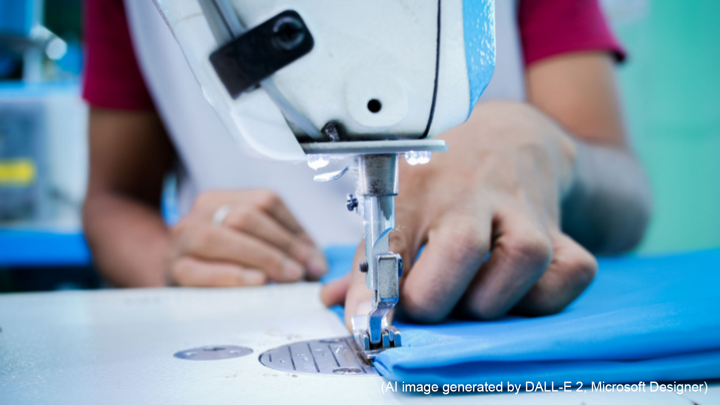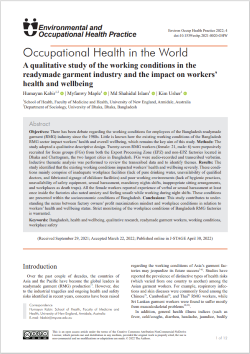#E0048 A qualitative study of the working conditions in the readymade garment industry and the impact on workers’ health and wellbeing

How Workplace Conditions Affect Workers’ Health in Bangladesh’s Readymade Garment Factories
Countries in the Asia-Pacific region lead the world in readymade garment (RMG) production. In particular, Bangladesh tops the list in terms of export growth, which has relied solely on the supply of RMGs to the international market. Despite its crucial role in the global supply chain, however, the country’s RMG industry continues to draw flak for its poor working conditions. Further, frequent reports of casualties and catastrophes have raised serious concerns regarding the health and wellbeing of the workers, who number in millions.
A recent study on RMG workers from Dhaka and Chattogram – the two major cities in Bangladesh – has now revealed that the workers’ health and wellbeing are being severely impacted by their poor working conditions. The findings were based on analyses of responses from 27 workers, who participated in this qualitative exploratory study.
The study reveals a lack of basic workplace amenities in these factories, such as drinking water, ventilated workspaces, scheduled food breaks, and day care facilities, which affects the health status of the workers. Further, a lack of qualified doctors at these sites prevents the workers from accessing timely healthcare when needed.
Additionally, the absence of hygienic toilets, safety equipment, and adequate seating arrangements reveals a disturbing pattern of consistently poor workplace conditions. Moreover, an absence of adequate ventilation and cooling at the overcrowded and congested factory sites increases the risk of acquiring transmissible viral infections.
Female RMG workers also reported experiences of frequent incidents of sexual harassment and feeling unsafe while working mandatory night shifts.
However, factories located in the export processing zone (EPZ), which are owned primarily by foreigners, fare slightly better owing to the strict monitoring of their workplace environments. In contrast, workers at non-EPZ factories, which are mostly owned by businessmen, suffer more due to the profit maximization mindset of the factory owners. The already poor working conditions are further compounded by suboptimal wages and difficult living conditions, making for a life of suffering.
Overall, this study sheds a much-needed light on the health vulnerabilities of RMG workers in Bangladesh, highlighting the urgent need for collective efforts from stakeholders to reverse this situation.

Link to original journal article:
https://www.jstage.jst.go.jp/article/eohp/4/1/4_2021-0020-OHW/_article
Title of the paper:
A qualitative study of the working conditions in the readymade garment industry and the impact on workers’ health and wellbeing
Authors:
Humayun Kabir, Myfanwy Maple, Md Shahidul Islam, and Kim Usher




